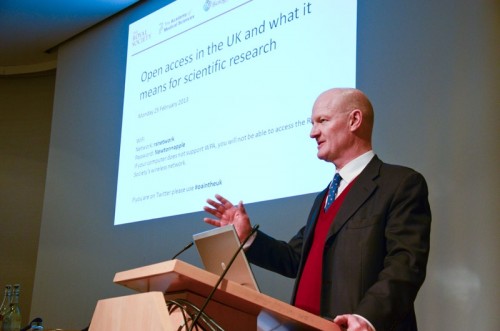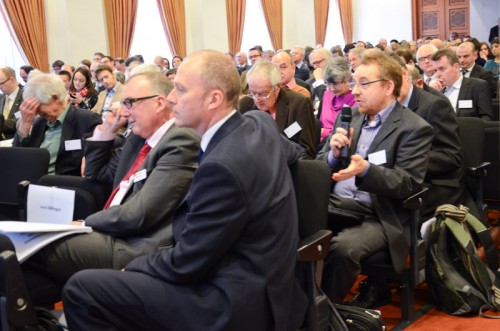
David Willetts speaking at the open-access meeting at the Royal Society.
(Courtesy: Jesse Karjalainen/IOP Publishing)
By Michael Banks
Yesterday I headed to the Royal Society in London to attend a meeting on open access and what it means for scientific research.
From what I heard at the meeting, I was surprised to learn that some scientists were largely unaware of how it could change scientific publishing.
In 2011 the UK government commissioned the British sociologist Janet Finch to look into the different ways that it would be possible to make research freely available to read.
The Finch working group, consisting of academics, publishers, librarians and representatives from learned societies, released its report in June, concluding that the UK should lead the way in transforming scientific publishing from a “reader pays” to an “author pays” model, supporting the need for a fee – known as an article processing charge – to fund open-access journals. (The Finch group included Steven Hall, managing director of IOP Publishing, which publishes physicsworld.com.)
After the report’s publication, the UK government announced that it had accepted almost all of Finch’s recommendations and came out in favour of the use of “gold” open-access publishing, whereby authors pay a fee to publish in an open-access journal and the paper is then immediately made available for anyone to read free of charge. It prefers this to “green” open-access publishing, where the published paper is placed behind a publisher’s paywall but then later deposited in a centralized free-to-access repository after a certain embargo period.
Yet almost six months on from that policy announcement, there is still a question mark over whether UK scientists will actually use the £17m of funding set aside by the government to cover open-access publishing costs in 2013/2014.

Participants at the open-access meeting held at the Royal Society.
(Courtesy: Jesse Karjalainen/IOP Publishing)
For instance, Tom Welton, a chemist from Imperial College London, told delegates at the Royal Society meeting about a pilot scheme at his university whereby researchers could access a pot of money to make their papers open access.
When hardly anyone took up the funds, this led him – rather crudely – to conclude that over 90% of academics are not interested in open access. “This [move to open access] will only happen if academics want it,” he said.
Another word of caution came from Glasgow University physicist Miles Padgett. Although he says academics broadly support sustainable open access, “very few” actively seek to publish their papers in open-access journals.
“Ideally we don’t want to start taking money away from other things to fund open access,” Padgett warned. “And we certainly don’t want to go down the route where there is a lack of funds and I then have to make a decision which of my colleagues can publish or not.”
With the open-access debate moving away from “theory” and more to implementation, there are still a whole host of issues that need to be hammered out if scientists are going to embrace it.
Indeed, UK science minister David Willetts made an appearance at the meeting, giving a brief statement and reiterating the government’s stance that it favours gold over green open access.
But he also accepted it won’t be an easy ride. “The challenge now is implementation and we are open to discussion about that, but we accept there are some real issues on transition,” he said.
This is something that Finch herself remarked upon when closing the meeting. “The situation is moving all the time,” she said. “And there is still a long way to go.”
I noted this quote:
“This [move to open access] will only happen if academics want it”
With respect, it isn’t down to academics. It’s down to the people who provide their funding. Where academics aren’t reliant upon public funding all well and good. But if they are, I would volunteer that the public do not expect to shell out the big bucks demanded by journals in order to read what they’ve already paid for. IMHO if that carries on, a perception will grow that academics are suffused with hubris, and the result will be funding pressure. All involved should note recent news re open access in the USA. See for example this reportage.
If one gets out of UK, there will an overwhelming majority of authors around the world whose institutions at present or in the near future, will not have the means to pay for their papers to be publised in peered Journals.
I was relieved to see, following this Guardian article – http://www.guardian.co.uk/science/blog/2013/feb/12/peerj-open-access-academic-publisher?INTCMP=SRCH – that the IOP’s article charge for the New Journal of Physics at USD1760 is nearer to PLOS ONE than it is to Elsevier’s or Springer’s charges – http://iopscience.iop.org/1367-2630/page/Article%20charge – and that charges can be waived for lower-income countries. So at least it looks like the learned societies can develop a sustainable model that matches the leading open-access journal.
[I work for the IOP, but not in our publishing arm.]